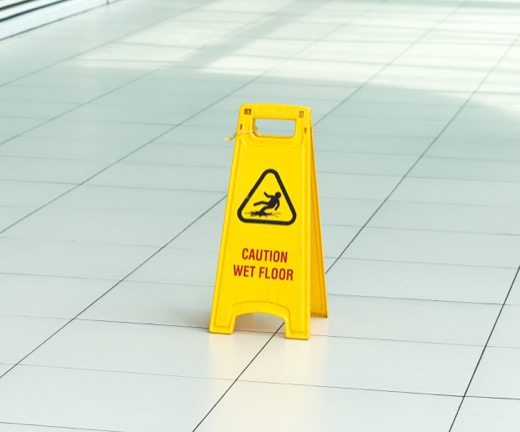Recognizing Hazards for Slips, Trips, and Falls in the Workplace
Slips, trips, and falls in the workplace can lead to injury or death in some cases. The United States Department of Labor Occupational Safety and Health Administration (OSHA) has developed a checklist for employers to review their work space to see if there are any hazards that could be identified and eliminated. Taking the time to review the general areas where slips, trips, and falls can occur can save an employer countless hours of lost employee labor due to injury and workplace shutdowns. It can also save an employer considerable amounts of money.
General Work Environment
It is critical for employers to have a functioning housekeeping or janitorial program in place. This service should be well documented, including what activities are (and are not) expected, how frequently, and by whom. Work stations should be sanitary, orderly, and clean. All workspaces should be kept dry and should be adequately lit.
Waste, debris, and combustible scraps should be identified as such. They should be safely stored. Paint soaked waste and oily waste should be disposed of in metal cans. There should be a regular schedule of removal of these items. In addition, all waste removal and discard should be done in accordance with local, state, and federal laws.
Dust should be recognized as a combustible substance, and should be routinely removed from surfaces that are elevated. A careful review of the work space should identify areas that require regular dusting.
Aisles and Walkways
Aisles and walkway should be adequately lit, marked as appropriate, and kept clear of debris. Where aisles and walkways are covered with rugs, mats, or carpets, it is essential they are properly anchored. Mats, rugs, and carpets should be examined periodically to assure that there are no worn, frayed, or upturned edges, which could lead to tripping. If there is an area of an aisle or walkway that is habitually wet, the surface should be covered with high traction material, with an eye toward a safer surface. The aisles and walkways should be free from protruding objects, cable wiring, open drawers, cords, and other obstacles
Spills should be cleaned up immediately. This should be coordinated with the housekeeping staff. It’s important that aisles and walkways have adequate headroom. If there is a change in elevation, this must be clearly identifiable. If the walkways elevated, guardrails must be present.
Stairs, Stairways and Ramps
Stairs, stairways, and ramps must be adequately lit. In case of an emergency, generator or battery-powered emergency lighting must be available to light the stairway. In all stairwells with four or more steps, handrails must be present. Handrails are also required on ramps. The handrails should be between 30 and 34 inches from the leading edge of the stair treads. Handrails should also be located at least three inches from the wall that they’re mounted on.
Stairway should be at least 22 inches in width. In staircases where the stairs change directions, there must be landing platforms. Stairs should be of uniforms shape and size. They should also have slip resistant surfaces.
Escalators
The handrail on the escalator should be easy to hold. Escalator safety procedures should be posted at every escalator, at both the top and the bottom. Escalators should have under-step lighting both at the bottom landing and the top landing. This is to provide a clear visual indicator of both the starting point and ending point of the escalator. The side clearance between the step and the sidewall should be no more than 3/16 of an inch. It’s important that sidewalls are made from low friction materials. This is so shoes will not stick to the sidewalls. Every escalator should have emergency shut off buttons both at the bottom and the top of the stairs. There should be sensory devices installed on all escalators. These sensors are intended to detect foreign objects and should result in immediate shut off of the electric escalator.
Elevated Surfaces
Signs should be posted, clearly illustrating the elevated surface load capacity. On surfaces that are more than 30 inches above the floor or the ground, guardrails must be installed.
There must be a permanent means of egress and access to elevated storage and elevated work surfaces. Headroom must be appropriate for elevated surfaces. Any materials that are stored or placed on elevated surfaces must be put there in a manner that prevents them from tipping, collapsing, rolling, falling, or spreading.
Ladders and Scaffolding
Portable stepladders should not be higher than 20 feet. They should be equipped with a metal spreader or a locking device. Single ladder heights should be 30 feet or less. Where extension ladders are used, the height of the ladder should be limited to 60 feet or less.
Scaffolds and ladders must be free from loose rungs, cracks, and sharp edges. They should also be free from grease and dirt. Scaffolds and ladders should have slip resistant grips. Footings for scaffoldings must be sound, rigid, and capable of carrying the advertised maximum load. The scaffolding itself must be capable of carrying four times the maximum load. Employees should be carefully instructed about appropriate safety standards and safety procedures, prior to using ladders and scaffolds.
Parking Lots and Sidewalks
Parking lots and sidewalks should be maintained and kept clear of falling debris and loose gravel, as well as timber. Curbs and ramps must be color-coded properly. Speed bumps and tire stops must be clearly marked.
It’s important that parking lots and sidewalks be kept clear of snow and ice. Parking lots and sidewalks should be adequately lit. They should be free from upheaval, and other surface defects. Spills and fluids in parking lots and sidewalks should be cleaned up immediately. Where there are slight changes in elevation, these changes must be clearly identified.
If You or a Loved One Have Been Injured at Work
If you or a loved one has been injured at work, contact the experienced Florida workers’ compensation attorneys at Madalon Law. There is no fee unless we collect on your behalf! Contact us today.







